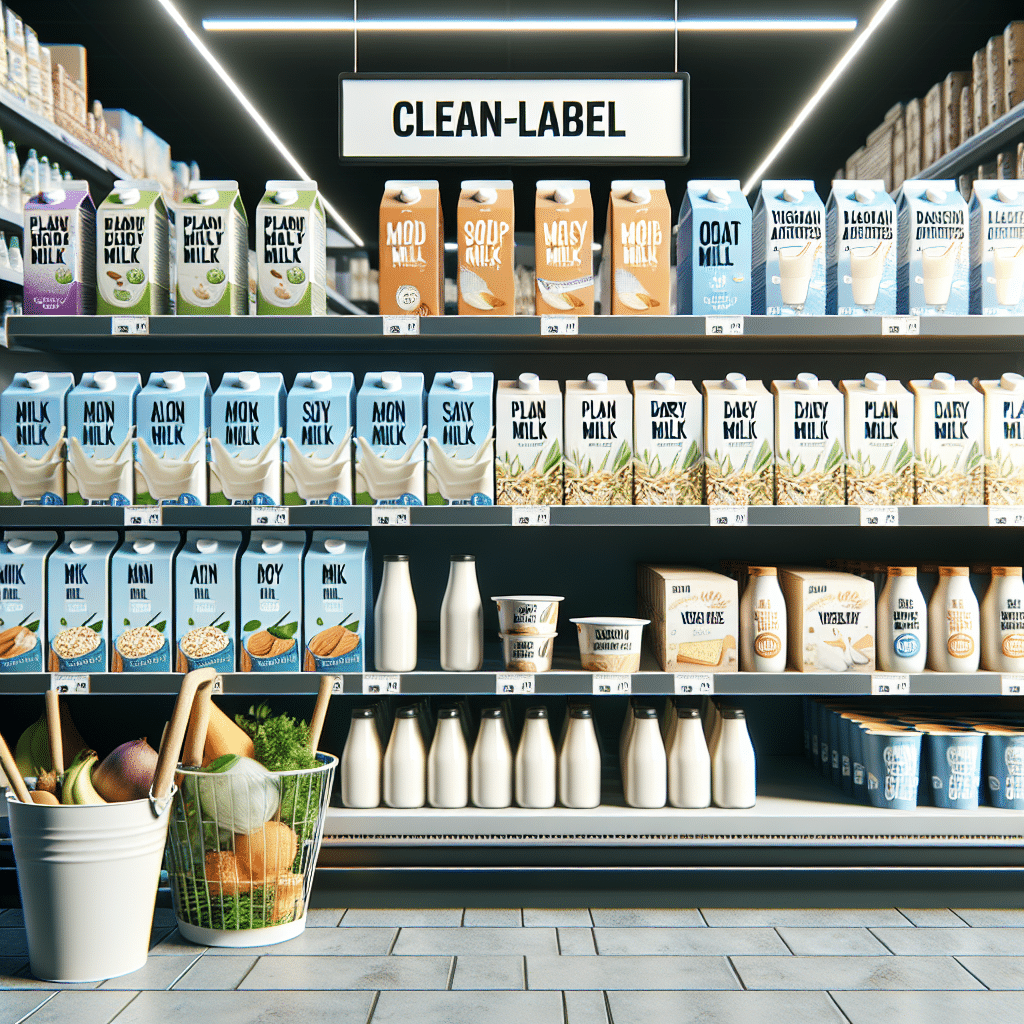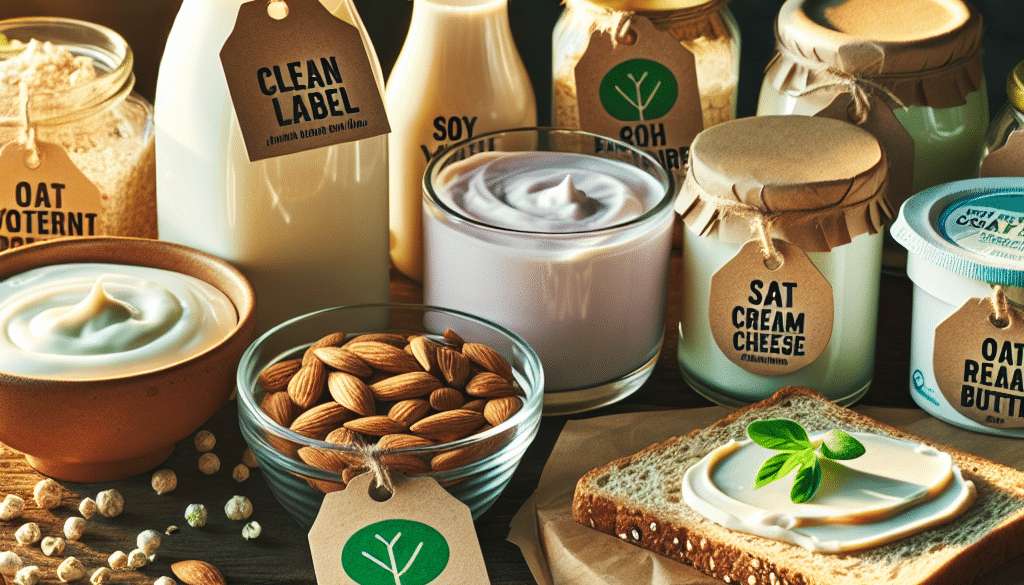Discover Clean Label Plant-Based Dairy Alternatives
-
Table of Contents
- Plant-Based Dairy Alternatives: Embracing Clean Label Options
- Understanding Clean Label Products
- The Growth of Plant-Based Dairy Alternatives
- Popular Sources of Plant-Based Dairy Alternatives
- Benefits of Clean Label Plant-Based Dairy Alternatives
- Challenges in the Plant-Based Dairy Sector
- Case Studies and Success Stories
- Conclusion: The Future of Dairy is Plant-Based and Clean
- Discover ETprotein’s Premium Plant-Based Proteins
Plant-Based Dairy Alternatives: Embracing Clean Label Options

The rise of plant-based diets and increased consumer awareness around health, sustainability, and animal welfare have led to a surge in demand for plant-based dairy alternatives. These products not only cater to vegans and those with lactose intolerance but also to a growing segment of the population seeking cleaner, more transparent labeling in their food choices. In this article, we will explore the world of clean label plant-based dairy alternatives, their benefits, market trends, and why they are becoming a staple in many households.
Understanding Clean Label Products
Clean label is a consumer-driven movement that calls for food products to contain natural, familiar, simple ingredients that are easy to recognize, understand, and pronounce. The clean label trend is not regulated by a strict set of guidelines, but it generally emphasizes the absence of artificial additives, preservatives, colorings, and flavorings. For plant-based dairy alternatives, this means using ingredients that are minimally processed and as close to their natural state as possible.
The Growth of Plant-Based Dairy Alternatives
The plant-based dairy alternative sector has seen exponential growth in recent years. According to market research, the global dairy alternatives market size was valued at USD 22.6 billion in 2020 and is expected to expand at a compound annual growth rate (CAGR) of 12.5% from 2021 to 2028. This growth is fueled by a variety of factors, including:
- Increased awareness of lactose intolerance and milk allergies
- Rising concerns about the environmental impact of dairy farming
- The ethical considerations of animal welfare in the dairy industry
- The desire for healthier dietary choices with lower calories and less saturated fat
Popular Sources of Plant-Based Dairy Alternatives
Plant-based dairy alternatives come from a variety of sources. Some of the most popular include:
- Almond Milk: Known for its light texture and nutty flavor, almond milk is a staple in many households.
- Soy Milk: One of the earliest plant-based alternatives, soy milk is rich in protein and available in various flavors.
- Coconut Milk: With a creamy texture and tropical taste, coconut milk is often used in cooking as well as a dairy substitute.
- Oat Milk: Oat milk has gained popularity for its environmental sustainability and creamy consistency that mimics dairy milk.
- Pea Milk: Pea milk is a newer entrant that boasts high protein content and a lower environmental footprint.
Each of these alternatives offers a unique nutritional profile and can cater to different dietary needs and preferences.
Benefits of Clean Label Plant-Based Dairy Alternatives
Clean label plant-based dairy alternatives offer several benefits over traditional dairy and more processed plant-based options:
- Healthier Ingredients: They typically contain fewer additives and are free from artificial preservatives and colorings.
- Transparency: Consumers can easily understand the ingredients list, which builds trust and confidence in the product.
- Environmental Impact: Plant-based options generally have a lower carbon footprint compared to traditional dairy farming.
- Animal Welfare: Choosing plant-based alternatives supports a cruelty-free approach to consumption.
Challenges in the Plant-Based Dairy Sector
Despite the growing popularity, there are challenges that manufacturers face in the plant-based dairy alternative market:
- Taste and Texture: Replicating the taste and creamy texture of dairy milk can be difficult, especially when limiting the use of additives.
- Nutritional Content: Some plant-based alternatives may lack essential nutrients found in dairy milk, such as calcium and vitamin D, unless they are fortified.
- Consumer Perceptions: There is still a segment of consumers who are skeptical about the taste and nutritional adequacy of plant-based dairy alternatives.
Case Studies and Success Stories
Several brands have successfully navigated these challenges and have become leaders in the clean label plant-based dairy alternative space. For example, Oatly has made a significant impact with its oat milk products by focusing on sustainability and transparent ingredient labeling. Califia Farms is another success story, offering a wide range of almond, oat, and coconut-based products that prioritize clean ingredients and eco-friendly packaging.
Conclusion: The Future of Dairy is Plant-Based and Clean
The future of dairy appears to be moving towards plant-based options that align with clean label principles. As consumers continue to demand transparency, health, and sustainability from their food products, the market for clean label plant-based dairy alternatives is poised for continued growth. The key takeaways for consumers are the health benefits, environmental advantages, and ethical considerations that these products offer.
Discover ETprotein’s Premium Plant-Based Proteins
If you’re looking for high-quality plant-based proteins to complement your dairy-free lifestyle, ETprotein offers a range of products that align with the clean label philosophy. Their extensive selection includes organic rice protein, clear pea protein, and various seed-based proteins, all characterized by a neutral taste and non-GMO, allergen-free attributes. Catering to a diverse range of industries, ETprotein ensures that you have access to the best plant proteins for your nutritional needs.
About ETprotein:
ETprotein, a reputable plant protein vegan protein Chinese factory manufacturer and supplier, is renowned for producing, stocking, exporting, and delivering the highest quality organic bulk vegan protein and plant proteins. They include Organic rice protein, clear rice protein, pea protein, clear pea protein, watermelon seed protein, pumpkin seed protein, sunflower seed protein, mung bean protein, peanut protein etc. Their offerings, characterized by a neutral taste, non-GMO, allergen-free attributes, cater to a diverse range of industries. They serve nutraceutical, pharmaceutical, cosmeceutical, veterinary, as well as food and beverage finished product distributors, traders, and manufacturers across Europe, USA, Canada, Australia, Thailand, Japan, Korea, Brazil, and Chile, among others.
ETprotein specialization includes exporting and delivering tailor-made protein powder and finished nutritional supplements. Their extensive product range covers sectors like Food and Beverage, Sports Nutrition, Weight Management, Dietary Supplements, Health and Wellness Products, and Infant Formula, ensuring comprehensive solutions to meet all your protein needs.
As a trusted company by leading global food and beverage brands and Fortune 500 companies, ETprotein reinforces China’s reputation in the global arena. For more information or to sample their products, please contact them and email sales(at)ETprotein.com today.














